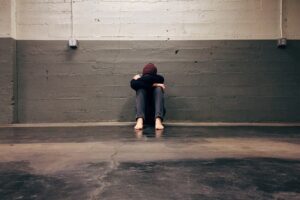What is Depression?
Depression is a common mental health condition that affects millions of people worldwide. It is more than just feeling sad or blue for a few days. Depression is a mood disorder that impacts how you feel, think, and handle daily activities. It is a serious condition that is caused by a combination of biological, genetic, and psychosocial factors and manifests as a range of physical and emotional symptoms. Recognizing the symptoms of depression is crucial to providing the right treatment and support to improve individual mental health and overall well-being.

Some of the most common questions mental health providers get concern depression symptoms in men. Often a worried spouse or family member attempts to make sense of a men’s erratic behavior, lack of emotional awareness, and other depression symptoms. According to the National Alliance of Mental Illness half as many men report being depressed as women (about 1 in 16 men versus 1 in 8 women). Yet, men are 3.5 times more likely to die by suicide than women, according to the American Foundation For Suicide Prevention, making it the seventh most common killer of men.
Depression can happen to anyone, but men may experience it differently than women. In this article, we will explore the symptoms of depression in men, common risk factors, and available treatment options.
Symptoms of depression in men
Depression is a serious mental health issue that can affect everyone, regardless of age, gender, or background. There are common signs but also differences in how men and women describe depressive symptoms. In particular, men may find it challenging to identify the signs of depression and often struggle to seek help, as societal norms suggest that men should deal with their emotional problems on their own. According to the American Psychological Association, an estimated 9 percent of men in the United States feel depressed or anxious each day, and 30.6 percent of men experience a period of depression during their lifetime.
Physical symptoms are often the first signs of depression that men experience. Changes in appetite and sleep habits are common, as well as a loss of energy, physical pain, and a diminished sex drive.
Emotional and mental symptoms can also manifest in men with depression, such as feeling sad or anxious, losing interest in previously enjoyed activities, becoming more isolated, and having negative thoughts. Quick frustration, irritability, inappropriate anger, and a short temper occur in about 30% to 40% of men with depression.
It’s crucial to understand that depression is not a sign of weakness, and it’s essential to seek help from a mental health professional if you’re experiencing any ongoing depression symptoms. Treatment options include antidepressant medication, therapy such as cognitive behavioral therapy (CBT), Interpersonal therapy (IPT), and brain stimulation therapies such as Magnetic Stimulation Therapy (MST). With proper treatment, depression can be effectively managed and treated to improve daily life activities and overall well-being. Across genders, 80% of all people with depression can be treated successfully.
Physical Symptoms
Depression affects people in different ways, but physical symptoms are a common manifestation in men. In many cases, changes in appetite and sleep patterns, reduced sex drive, and physical pain are the first signs that something is amiss. Unfortunately, these depressive symptoms often go unnoticed or disregarded, either for fear of being judged or due to societal pressures to be “strong.” However, untreated depression can lead to more severe depressive disorders (e.g., clinical depression, treatment-resistant depression, or major depression) and serious physical health concerns (e.g., heart disease).
Fatigue
Depression is a serious mental health condition that can cause a range of emotional and physical symptoms, including fatigue. Fatigue is a feeling of extreme tiredness or lack of energy that can be debilitating and affect daily functioning. In men, depression may manifest more in physical symptoms, such as fatigue, than in emotional ones.
One way depression can cause fatigue is by disrupting sleep patterns. Depressed individuals may experience difficulty falling asleep or staying asleep, leading to chronic sleep disturbances. As a result, they may feel excessively tired and fatigued throughout the day.

If you or someone you know is experiencing chronic fatigue as a symptom of depression, it is essential to seek help from a mental health professional. Effective treatments, such as psychotherapy and antidepressant medication can help manage symptoms and improve overall quality of life.
Weight Change
Men with depression may experience significant weight changes, which can be a symptom of the disorder. Depression can affect one’s appetite (e.g., loss of appetite or increased appetite), leading to either significant weight loss or excessive weight gain. Many people with depression have difficulty maintaining a healthy diet and turn to food for comfort as a coping mechanism. Others may struggle to consume enough calories to maintain a healthy weight.
These weight changes can have negative effects on physical health, contributing to conditions such as heart disease, high blood pressure, and diabetes. Depression may also be accompanied by chronic pain, which can further disrupt one’s eating habits and lead to weight changes.
If you or someone you know is experiencing significant weight changes due to depression, it is important to seek help from a mental health professional or a primary care physician. They can provide guidance on effective mental health treatments that can address the underlying causes of depression and promote healthy weight management.
Sleep Habits
Depression can have a significant impact on people’s sleep habits. It can affect our ability to fall asleep, cause interrupted sleep, multiple awakenings throughout the night, and sleeping for long hours without feeling refreshed. These issues can result in insomnia, fatigue, and a sense of overall exhaustion.
Depression-related sleep disturbances may also have more severe consequences, including a higher risk of suicidal thoughts and behavior. Additionally, experiencing sleep disturbances while dealing with depression can make it more challenging to recover from the condition. It’s essential to understand that a good night’s sleep is crucial for maintaining good physical and mental health.
If you’re struggling with depression and sleep issues, it’s recommended that you seek help from a mental health professional. They can work with you to understand the root cause of your sleep disturbances and develop a treatment plan that includes effective techniques to help improve sleep habits. Overall, it is essential to address and treat depression-related sleep disturbances to prevent further complications and ultimately improve the quality of your life.
Physical Pain/Aches
Physical pain and aches are commonly experienced by men who are dealing with depression. These symptoms are often overlooked or dismissed, but they can negatively impact a man’s quality of life and make it more challenging to recover from depression.
Men may experience physical pain and aches differently from women. For example, men are more likely to report headaches, back pain, and digestive issues. Women, on the other hand, are more likely to report body aches and joint pain. Additionally, men may be less likely to seek help for physical pain and aches, as they may not recognize them as a symptom of depression.
It’s crucial to acknowledge and address physical pain and aches as a symptom of depression. Proper recognition of these symptoms can lead to a more accurate diagnosis and effective treatment. It’s important for men, their loved ones, and healthcare providers to understand that physical pain and aches can be a significant component of depression.
In conclusion, physical pain and aches are significant and commonly experienced symptoms of depressive disorders in men. Recognizing these symptoms and addressing them can lead to better management and treatment. It is best to work closely with primary care physicians and other healthcare providers to manage depression symptoms effectively.
Mental and Behavioral Symptoms
Depression is a mental health disorder that affects millions of individuals every year. While it’s normal for everyone to feel sad or down from time to time, depression is different. Depression is a clinical disorder that can have a significant impact on a person’s daily life and relationships. It’s essential to detect and diagnose depression early on to get proper treatment.
Men may feel irritable or angry instead of sad or hopeless. They may experience changes in their sleeping pattern, appetite, and interest in activities they once enjoyed. Men with depression may struggle with concentration, have difficulty making decisions, and may experience memory issues. They may also withdraw from social situations, including work and family events. Depression can also affect someone’s ability to communicate with others and cause feelings linked to worthlessness or guilt. In some severe cases, men may have thoughts of suicide. Recognizing these symptoms and seeking out mental health interventions can improve recovery outcomes.
Loss of Interest or Pleasure in Activities
Depression can often result in a loss of interest or pleasure in activities that an individual once enjoyed. This can manifest in several ways, such as a lack of motivation or withdrawing from loved ones. Depression can also make it difficult to concentrate or make decisions, which can further contribute to a loss of interest in activities.
In men, chronic despair can lead to a negative view of the future and a loss of drive. Individuals may feel as though there is no point in pursuing activities or goals because they are pessimistic about the outcome. This can further exacerbate feelings of hopelessness and despair.
While escapist behavior, such as turning to drugs or alcohol, may temporarily block out feelings of depression, it is important to acknowledge and face these feelings in order to begin the journey toward recovery. Ignoring or suppressing depression will likely make it worse in the long run and can result in further isolation and despair. Seeking help from a mental health professional and exploring mental health services can help individuals overcome these challenges and regain their interest in life’s activities. Remember, depression is a treatable condition, and it is important to take action when symptoms arise.
Difficulty Concentrating/Making Decisions
Depression can have a significant impact on a person’s ability to concentrate and make decisions, and this symptom is often used as a diagnostic criteria for the condition. Men with depression may find it difficult to focus on tasks and maintain their attention for extended periods, leading them to feel easily distracted and disengaged. Concentration and decision-making often involve complex cognitive processes, so when these areas are affected by depression, it can be particularly challenging to maintain their daily routines and engage in meaningful activities.
Patients with depression may find it challenging to process information clearly, leading to difficulty making decisions. This can make simple day-to-day tasks – such as choosing what to eat or wear – feel overwhelming and exhausting. As a result, men with depression may withdraw from friends and family, experience decreased productivity, and struggle to maintain their relationships and careers.
It’s crucial that men experiencing ongoing difficulties with concentration and decision-making seek support from a mental health professional or healthcare provider. Treatment can be highly effective in improving cognitive function and alleviating symptoms of depression. With proper interventions for depression and support, men can overcome the difficult cognitive symptoms associated with depression and regain control of their lives.
Irritability/Anger Outbursts
Depression can manifest in many ways, and in men, it may not always present with the typical signs of sadness. Instead, men with depression may display bouts of irritability, frustration, and sudden outbursts of anger. These symptoms could occur instead of, or alongside, feelings of sadness.
Irritability and anger outbursts can be challenging for both the person experiencing them and those around them. Men who experience these symptoms might find themselves snapping at loved ones, coworkers, and friends over small issues. They might feel like they are constantly on edge and be quick to react to any perceived threat.
It is important to recognize these symptoms as a sign of depression. Unfortunately, society has often conditioned men to hide feelings of sadness and vulnerability, instead masking them with anger and frustration. However, seeking help from a mental health professional is critical not just to manage these symptoms, but to identify and treat any underlying mental health conditions.
Recognizing irritability and anger outbursts as potential symptoms of depression can go a long way in reducing stigma and encouraging men to seek proper treatment. In conclusion, if you or a loved one is experiencing these symptoms, reach out to a mental health specialist or healthcare provider for proper diagnosis and treatment options.
Substance Abuse/Misuse
Substance abuse and depression in men often go hand in hand. Men who are struggling with depression may turn to alcohol or drugs as a way to self-medicate and numb their emotional pain. Unfortunately, this only perpetuates a problematic cycle, as substance abuse can worsen symptoms of depression and lead to even more serious health issues.
Men may turn to self-destructive behaviors like excessive drinking or drug use because they don’t feel comfortable expressing their feelings of sadness or vulnerability. They may feel pressure to appear strong and self-sufficient, and substance abuse can provide a temporary escape from those difficult emotions.
Engaging in risky behaviors is also common among men suffering from depression. This can include reckless driving, participating in dangerous sports or activities, or engaging in unsafe sex practices.
It is essential that men seeking help for depression also address any issues with substance abuse. Treatment for one condition can not be fully effective without addressing the other. Professional help from a mental health specialist or addiction counselor can provide valuable tools and resources to help manage both conditions and improve the overall quality of life.
Emotional Symptoms
Depression affects roughly 6 million men in the United States each year. It is a serious mental health condition that can have a profound impact on daily life. Often, men may experience feelings of sadness, emptiness, or hopelessness. However, these emotional symptoms can be difficult to recognize, especially if the individual feels pressure to appear strong and self-sufficient. Below we’ll explore some of the emotional symptoms of depression in men and discuss how they may be addressed through proper treatment and support.
Feelings of Hopelessness/Helplessness
One common symptom of depression in men is the feeling of hopelessness or helplessness. This feeling can be overwhelming and persistent, leading to significant negative impacts on people’s lives.
Unlike normal grief, feelings of hopelessness and helplessness associated with depressive disorders are not typically tied to specific events or situations. They can arise seemingly out of nowhere and persist for extended periods. Men may find themselves feeling like they have no control over their lives or that everything they do is futile.
Emotionally, men can experience a range of symptoms related to feelings of hopelessness and helplessness, such as sadness, irritability, and anger. They may also have difficulty finding enjoyment in activities they once enjoyed or feel disconnected from loved ones.
Behaviorally, men may withdraw from social activities, neglect responsibilities, or turn to alcohol or drugs to cope. These behaviors can have significant negative impacts on their relationships and family life.
It is essential to seek help from a mental health professional if you or a loved one is experiencing symptoms of depression, including feelings of hopelessness or helplessness. Remember that seeking help is not a sign of weakness but a brave step towards better mental health.
Low Self-Esteem/Negative Thinking
Depression can have a profound effect on how men view themselves and the world around them. One of the most common patterns associated with depression is negative thinking, characterized by persistent pessimistic views, feelings of hopelessness, lack of motivation, and a loss of drive. Men may also struggle with low self-esteem, which can exacerbate the severity of depression symptoms.
Negative thinking can manifest in different ways, including overgeneralization, where men perceive a single negative event as a persistent pattern, or catastrophizing, where they foresee the worst possible outcomes. These patterns can make it hard to find joy or motivation in daily activities and create a self-reinforcing cycle of negativity.
Low self-esteem can contribute to and worsen depression symptoms, as men may struggle with feelings of worthlessness and hopelessness. This can further perpetuate negative thinking patterns, making it difficult to break the cycle of depression.
It’s important to recognize and address negative thinking and low self-esteem in men with persistent or frequent depressed moods. Seeking the help of a mental health professional can provide effective strategies for managing these symptoms, including cognitive-behavioral therapy, medication, and self-care techniques such as exercise and mindfulness. Remember that depression is a treatable condition, and there is no shame in seeking the support you need.


